- Home
- Alistair Moffat
To the Island of Tides Page 2
To the Island of Tides Read online
Page 2
When he came out of his back kitchen with a jug of water and glasses, this genial man had also put a large jar on the tray. Saying something like, ‘You lads won’t have tasted this before,’ he unscrewed the top and pulled out what looked like a twig with small blobs of green stuff stuck onto it. ‘This is samphire, edible seaweed,’ he explained, and drew the twig through his teeth, then pointed it towards the seashore. ‘Down by the causeway there’s plenty, but not many know what to do with it.’
The three of us probably exchanged glances, and I went first. It tasted of salty vinegar. A mild grimace must have escaped because the signalman laughed as he took the big jar back into the kitchen. ‘If you are wanting to cross’ – he waved his arm in the direction of the low sandy island we had seen in the east – ‘then you’ll need to get a move on.’ Of course, it had not occurred to any of us to check the tide times, probably because none of us knew how.
A few minutes later, having climbed the low hill where the hamlet of Beal clusters, a wide vista opened. Below us was the arrow-straight tarmac causeway, maybe a bit more than a mile long, and beyond that, the Holy Island of Lindisfarne, its village huddled around the ruins of the priory and the miniature castle rock further in the distance. To the north lay a long run of undulating sand dunes, and beyond all of that the shimmer of the North Sea and its endless horizon.
We hurried down the slope and began marching across the little black road that seemed built on sand, its edges fraying. On either side, the long, wet sands seemed to merge seamlessly with the sea, and there was no telling if the tide was coming in or going out. We were carrying hefty packs and moved as fast as we could towards the white refuge box that stood on stilts about halfway across. Its purpose was to rescue idiots like us, but when we reached it, we still could not tell if the tide was coming in and, being daft boys, we pressed on regardless. There was no other traffic on the causeway, wheeled or on foot, but of course the significance of that occurred to none of us.
By the time we were halfway between the refuge box and what seemed to be dry land (or was it?), there was no doubt. On both sides we could see the tide rising, what looked like a low wave running across the sands towards us. We began to jog, and when the sea washed across the tarmac we started to run. For the last hundred or so yards, we were forced to slow to a wet walk as we first splashed and then waded. And then the road rose up almost imperceptibly, suddenly dry, and we stopped, panting, shuffling off our rucksacks, then turning to look behind us as the tide raced across the black tarmac and rose up the stilts of the refuge box.
Landlocked boys raised forty miles inland amongst the meadows and cornfields of the Tweed Valley, we had no idea of the elemental power of the sea. No matter how far we strayed from home in Kelso on a summer evening, we could always walk back, always get home, even if there was a telling-off waiting. But here we were sea-locked; the tide had cut us off from the world, and nearly done worse. In moments, Lindisfarne had become an island, and we were stuck on it. Not so much bad planning as no planning.
Our boots and socks were soaking and there was nothing we could do about that except squelch along the road. I remember in those days I wore a green hooded anorak with a large, horizontally zipped pocket along the front. It was the sort you had to pull over your head. Under it my shirt was soaked with sweat, but the road to the village was long and sweeping. Perhaps I would dry off before we reached it and could ask when the tide was due to go out. By the time we started our damp trudge to the village, it was late afternoon.
At the age of fifteen I was as tall as I am now (or was until I started recently to shrink): six foot and a bit. So I decided that since no one knew us on this sudden island, we should go into a pub and order drinks, as well as ask about the tide times. My grannie, Bina, used to enjoy a glass of a sweet stout called Mackeson, and when my mum wasn’t looking she gave me a taste of it – and for it. It must have been a mixture of my Scottish accent and some nervousness, but when I ordered it the landlord put a large bottle of something called Double Maxim on the bar. Brewed by Usher Vaux, it was a brown ale that turned out to be revolting, bitter and sickly at the same time. Because we could not risk being found out as underage drinkers (we had seen a policemen in the village), we had to pretend to like it and between the three of us we managed quickly to swallow this vile concoction. Worse was to follow when the barman told us that the causeway would not open again until about 10 p.m.
By the time we left the pub, feeling a little tipsy, having flung down what turned out to be a strong ale (like Newcastle Brown Ale), our spirits plummeted when we saw that the village shop, the only possible source of food, had closed. I went back into the pub and bought three packets of crisps. Sitting on a bench near the ruins of the priory, having untwisted the blue packets of salt, shaken it over the crisps and then shaken the bags, we devoured our meagre supper and agreed that we should probably not cross the causeway in the half-dark and then blunder about trying to find somewhere to camp on the mainland. Better to stay on the island.
But where? The dunes to the north looked promising. When we walked out of the village, past some bungalows that seemed the epitome of comfort, their larders doubtless bulging with food, we saw a sign by the car park that sent our hungry spirits sinking ever lower: ‘By Order of the Cheswick Estates, No Camping’.
Why we decided to walk to Lindisfarne, or whose idea it was, is mercifully lost to memory. And looking back now, having helped raise children of my own, I am amazed that our parents allowed us to go so far from home without any adult accompaniment, or even any means of contacting them. My parents did not have the phone and I doubt if my companions’ families did either. It never occurred to me to ask them. In many ways the 1960s were more innocent times, but those degrees of trust and freedom still surprise me.
I recall that the year before, the three of us had been inspired by President Kennedy’s challenge to Americans to improve their fitness. His measure was simple. If you could walk fifty miles in twenty-four hours, you could claim to be fit – and in the summer of 1964, the year after Kennedy died in Dallas, we did it. Setting off in the middle of the afternoon, we walked through the night to Berwick-upon-Tweed from Kelso and back again with only a brief rest in a bus shelter. Somewhere near Norham, where the road bends around the entrance to a farm, we sat down on a grassy bank to eat the last of our sandwiches. I must have fallen asleep, for when I woke in the darkness, my friends had disappeared. Leaving me alone. As I took a few, fearful steps down the long and lonely road home, they jumped out from behind a tree. Perhaps because we managed that without mishap, our parents allowed us to do another long distance walk – although if we had told them of our antics on the causeway, it would have been the last one.
While the reasons for choosing Lindisfarne have long fled into the darkness of the past, there were plenty of grumbles about being on a bloody island with no food and no choice but to break the law by camping. As we approached the dunes across a broad, open area, a light came on in my head. If we did not camp, but only slept out, then the policeman we had seen could not arrest us. We were not camping, only sleeping. Nothing about that on the sign. And anyway, it was a mild, even balmy, night, with no breeze to speak of. Suddenly it seemed that our troubles were turning into an adventure.
By the time we passed the last of the fenced grass parks and their small, snuffling herd of cows, the sun had set away to the north-west, slipping behind the Cheviots, and gloaming fell. Beyond the farm fields lay the line of sand dunes and as the bright day gave way to full moonlight, we were able to find a path through the undulations and the clumps of spiky marram grass. Looking at a map, more than fifty years later, I think we must have walked towards the north-east corner of the island. So that we could keep lookout – for the police, and perhaps the enraged owner of the Cheswick Estates, or whoever had put up the sign – we searched the horizon for the highest dune.
For our fevered boyhood sense of conspiracy had persuaded us that we would definitely be hunt
ed, tracked down. In the village, all eyes had been on us. From behind curtains, behind the bar, on street corners, as we splashed across the causeway, we had been noticed. Definitely. Strangers were in town. And even now a group of vigilantes (we were well versed in the terms of TV westerns) were probably being deputised by the village policeman to form search parties to find and arrest these intruders. In these parts, Scots had long been thought of as suspect. Even if our lawyers could argue down the charge of illegal camping on a technicality, we could still be convicted of under-age drinking, a serious offence, especially in England, probably. At any moment sirens might wail, blinding searchlights clang on, and we would be hauled off to spend a night in the cells. In the dread phrase, my parents and Bina would be black affronted and my sisters would never let me forget it.
When we scrambled up the highest dune we could find, each step pushing down small avalanches of sand, we saw that there was a shallow plateau behind it, encircled by a ridge of sand held together by marram grass. Hunkering down there, we would be out of sight from below. One of us had found some Bassett’s Treacle Toffees in an ignored pocket and we sucked slowly on the sugar, trying to make each one last.
By some forgotten process, probably because it was all my fault, the under-age drinking in particular, it was decided that I should take the first watch while the other two laid out the ground sheet of the tent (was that camping?) and wriggled into their sleeping bags.
Using the rim of the sand dune like an imaginary rampart, I lay on my front looking south, the direction trouble would come from, and I scanned the twinkling lights of the sleeping village and the dark silhouette of the castle, presumably the stronghold of the fearsome owner of the Cheswick Estates and his henchmen. Far beyond, it seemed, I saw the sweeping beam of a lighthouse playing across the sea. At the time I did not know it was the Longstone light on the Farne Islands, the place from where Grace Darling and her father set out in their famous recue of shipwrecked sailors. Idiotically, I wondered if the light showed up our position to the bands of desperadoes who were roaming in the gloaming, hunting for us.
After a time, I turned to see that my companions were lying still, fast asleep. It was a balmy, windless night, well lit by a full moon, the sort of half-dark sometimes called the summer dim in the north of Scotland, and as thoughts of marauding bands of policemen gradually faded and a silence settled, I found myself looking, almost hypnotically, over the endless wastes of the North Sea and listening to the wash of the waves. To the south, there was enough light in the sky to see the outline of Bamburgh Castle, although I was not sure what it was. Little by little, the dune became less like a rampart and more like a high vantage point, a place from where I could see the sky, the sea and the land. My watchnight cannot have lasted more than an hour or perhaps two, but I remember it vividly.
Perhaps I am reading history backwards, but I think on that moonlit, silent night a peace descended on me, something I had not felt before. It may be that after the excitements, exertions and daftnesses of the day I simply relaxed, realising that no one was looking for us, that we were alone out in the dunes. But if that was so, then surely I would have fallen asleep like my companions. Instead, without knowing it, I think I was keeping vigil, unconsciously allowing the spirits of that place to swirl around me and release a sense of inner calm as I looked out over Creation. This may sound highly unlikely for a fifteen-year-old boy on the threshold of life, but looking back across the years I believe it to be true. It turned out to be a beginning of sorts.
Ignorant of the phrase, I sensed then that the island had a powerful genius loci, was a place of spirits. And each of the many times I have returned in the last fifty years, knowing more, I began slowly to realise that for me Lindisfarne might be more than beautiful, atmospheric. It might be the saving of me.
* * *
Now nearing the end of my seventh decade, I need to face some actuarial facts. I may have ten more summers of active, relatively healthy life in front of me, if I am lucky. But to enjoy them – and face the end when it comes – I need to change what is in my heart and soul. With much more past than future, I have found myself dwelling not so much on good memories as on the darknesses, all that went wrong, bad mistakes I made, people I hurt, people who wronged me or ignored me. In the half-light of early morning, drifting in and out of sleep, the ghosts of disappointments, mistakes, slights and regrets flit through my mind too often and I fear I am becoming more and more bitter rather than wise, accepting and forgiving, clinging to the hurts of the past rather than savouring the everyday joys of the present. What I need to find is some peace of mind and it occurred to me that if I took myself to Lindisfarne for a time, I might find some in that place of spirits. After all, the old name Ynys Medcaut, from Insula Medicata, means ‘the isle of healing’.
Buried for more than a century on the island, and once its bishop, Cuthbert was the great saint of the north. Durham Cathedral and the vice-regal powers of the medieval prince-bishops are his direct legacy and his tomb is still much venerated. But I believe that his spirit has never left Lindisfarne. As Cuthbert and his ascetic companions watched the sun rise over the grey chill of the North Sea and listened to the bleak music of the winds and the waves, they knew that all of the elements of the world were writ large before them. Somewhere in the huge skies above the island, God was moving and they prayed that somehow His spirit would descend and be revealed in this place that stood apart from the world.
Probably born and raised as the younger son of Anglian lords in the hills of Lauderdale in the Scottish Borders, Cuthbert came to the monastery at Old Melrose some time around 650 or 651. While tending sheep one starry night, the boy had looked out to the east and seen a vision, believed to be the ascent of the soul of St Aidan from his church on Lindisfarne. Much moved by this, Cuthbert rode to meet the monks in the loop of the River Tweed at Old Melrose and asked to take holy orders. When Prior Boisil died a few years afterwards, the shepherd boy succeeded him. And then, perhaps in 676, he laid down the cares of office and began life as a wandering hermit, seeking to move closer to God. Two caves near the Northumberland coast are associated with his exemplary life.
But by Christmas 686, Cuthbert knew that he was beginning to die and, having been reluctantly appointed Bishop of Lindisfarne two years before, he put down his cope, pectoral cross and staff to return to the purity and peace of his solitary life in the cold hermitage on Inner Farne. A short time later, he died.
As I have said, I am no Christian, and nor does mortification of the flesh hold many attractions, but I would like to seek something of the peace Cuthbert sought at the end of his life. My DNA ancestry is Northumbrian, as his must have been, and my people sailed the North Sea in the fifth and sixth centuries from Denmark and southern Sweden to settle on the eastern coasts and in the river valleys of Britain just as his people did. I was born and raised only a short distance from the hills where he tended sheep. I know that thirteen centuries separate us, but perhaps I could walk the holy ground of Lindisfarne in Cuthbert’s footsteps; perhaps some of the eternal spirits of that magical place would speak to me.
I began to plan a secular pilgrimage, to walk from the ancient monastery at Old Melrose to what I had come to think of as the Island of Tides, and on my way I would visit places where Cuthbert prayed, preached and wrought miracles. As well as trying to understand something of the harsh lives of these leathery old saints and their efforts to know the mind of God, I knew during this journey of endings and beginnings I would also come across some glorious, life-enhancing colour – from the disciplined joy of the Lindisfarne Gospels, the glittering culture of the kingdom of Northumbria, the scholarship of Bede of Jarrow, as well as the story of Cuthbert, one of the first and perhaps the greatest saint of Britain. And maybe I would discover on the Island of Tides that the tides in the lives of men are not so very different.
2
The Hill of Faith
It was a day of high summer. A cloudless July sky, perfectly still, wi
thout even a breath of a breeze riffling the topmost leaves of the old sycamores on the ridge above the track. In the Tile Field, about half a mile below our farmhouse, all the sheep and cattle were lying down and the only animals I could see moving were the four horses who graze the field beyond them. They are at a DIY livery at the neighbouring farm and each morning one or two women come with bowls of hard feed and a barrow to pick up their muck. It was so quiet I could hear them talking. It is astonishing how sound carries across our little valley, and this morning I could clearly hear the bleat of sheep in the fields above Brownmoor, as well as the distant purr of a quad bike as the shepherd went up onto the southern ridge to check on the flock about a mile to the south.
As Maidie, my West Highland terrier puppy, and I walked along the track by the old wood, the women must have been three-quarters of a mile away. Not far enough for Maidie. A very territorial terrier, she had stopped when the horsewomen began to speak, pricked her ears and barked loudly at them. How dare they! Who are they? This set off the collies up at Brownmoor, and then moments later, across the stillness of the morning, I heard the big, booming bark of Chiquita at Burn Cottage down at the bottom of the Long Track that leads to our farm. She is a huge Newfoundland. Doggy stereo rang round the hills. But it soon calmed down and we walked on through the waking landscape, stopping and staring at all our familiar glories.
We live on a small farm in the Scottish Borders. At least I think we do. I have never been sure what to call the little bit of the planet we own and look after. At eighty acres, it is bigger than a smallholding or a croft; I would wince if anyone called it an estate, but it seems too small to be a farm. We do not grow any crops except grass, and my wife manages about twenty-five acres of pasture to breed horses. So, I guess ‘small farm’ is the least inaccurate description. Below the house we have gradually built up a stable block that now has ten loose boxes, a hay barn and a tack room, and by the track that leads down to the lane and from there to the main road we have added more outbuildings, an arena and barns. One of these is my office, a large room overflowing with books and runs of periodicals that have helped me write mainly Scottish history over the last twenty-five years.

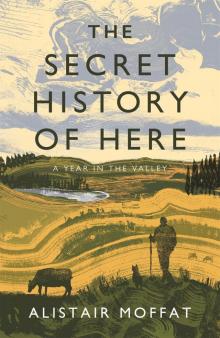 The Secret History of Here
The Secret History of Here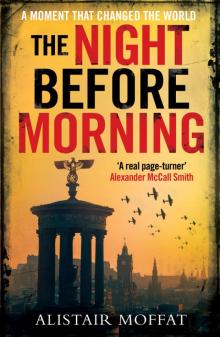 The Night Before Morning
The Night Before Morning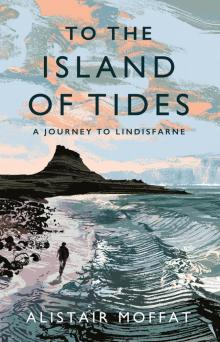 To the Island of Tides
To the Island of Tides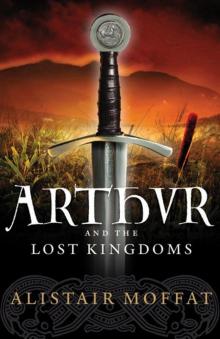 Arthur and the Lost Kingdoms
Arthur and the Lost Kingdoms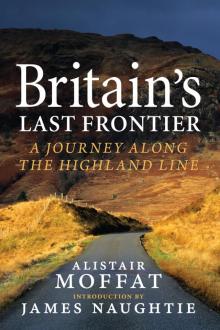 Britain’s Last Frontier
Britain’s Last Frontier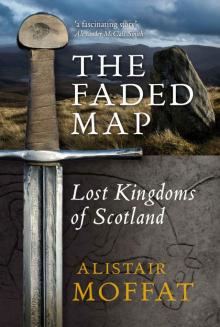 The Faded Map: The Lost Kingdoms of Scotland
The Faded Map: The Lost Kingdoms of Scotland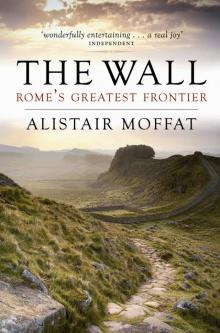 The Wall
The Wall